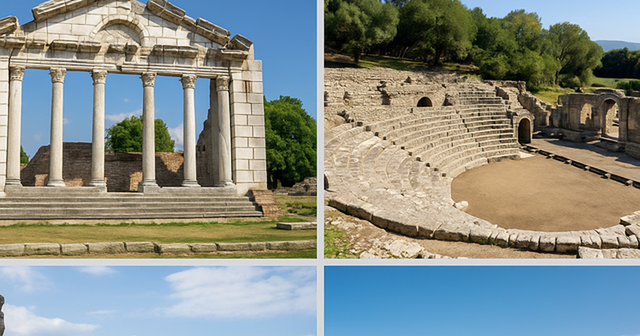
Apollonia and Bylisi, Greek or Illyrian? The centuries-old debate and an answer from Neritan Ceka


Were cities like Apollonia and Bylisi Greek or Illyrian? This is an old debate, kept alive more by political and nationalist interpretations than by historical and archaeological facts.
In an interview with Dritare TV, Professor Neritan Ceka, one of the most well-known figures in Albanian archaeology, gave a clear answer:
“Apollonia was a Greek colony, but in Illyrian territory. Bylisi was an Illyrian city, influenced by Greek culture, but not a colony. Both have a common heritage, but different identities.”
What do the facts say?
Apollonia was founded in the 7th century BC by Greek colonists from Corfu (Korkyra) and Corinth, but developed in coexistence with the local Illyrian population. It preserves Greek architectural structures, but also strong local elements, especially in political and military organization.
Bylis, on the other hand, was an Illyrian city, with prytans, strategos, and hipparches – common Greek titles in the administration of the time – but used by the Illyrians as a form of civic organization.
"The language used in the inscriptions is Greek, because it was the lingua franca of that time, but that doesn't mean they were Greek. Just as we are not English today, why do we write in English on social networks," said Ceka.
1. Politicization of history – Neighboring states, such as Greece, have attempted to extend cultural influence over territories outside of today's borders, interpreting every Greek element as proof of national belonging.
2. The influence of classical archaeology – Western historians, trained in Greco-Roman schools, have often underestimated the role of local cultures like the Illyrians.
3. Lack of a strong Albanian narrative – Albania has not promoted its Illyrian heritage in an organized manner for years and has left gaps that others have filled.
Facts that support Illyrian identity
• The inscriptions at Bylis mention institutions typical of Illyrian cities.
• Figures such as prytani, strategos and grammateus are also documented in other Illyrian cities.
• Local coins show local, not Greek, iconography.
• The funerary culture and rituals are different from those of the Hellenic colonies.
Ceka: History is not a matter of voting
"It doesn't matter what Greece or Albania wants these cities to be. What matters is what the inscriptions, the archaeology, the urban structure show. That's where the truth lies. We don't vote at the UN on whether a city was Illyrian or Greek."
Cities like Apollonia and Bylisi are evidence of a coexistence of cultures, where the Greek influence is evident, but the identity of the place and the population is Illyrian. Recognizing this reality is not to deny the influences, but to rely on facts and not on flags.

The Ukraine summit that ignored the tough questions
ideas
top
Alfa recipes
TRENDING 
services
- POLICE129
- STREET POLICE126
- AMBULANCE112
- FIREFIGHTER128




























